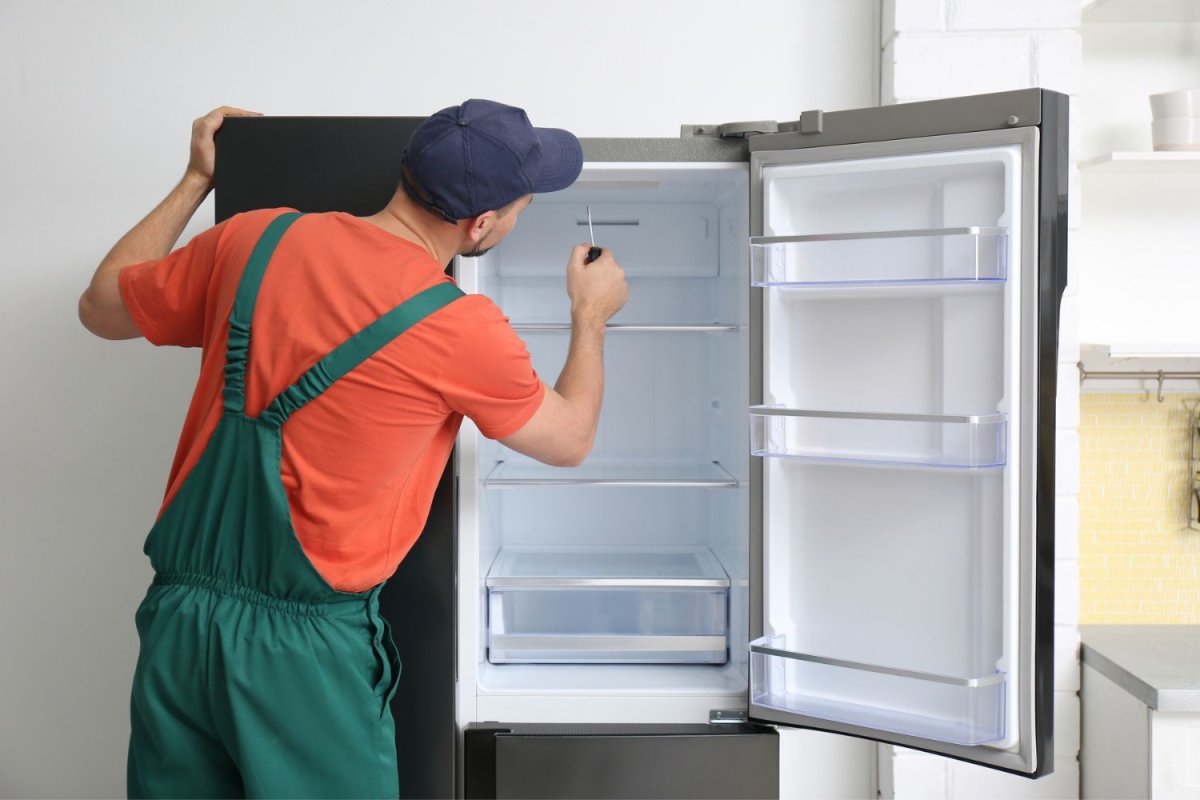

We may earn revenue from the products available on this page and participate in affiliate programs. Learn More ›
Q: I’ve had my refrigerator for a while now, and lately I’ve been experiencing a lot of issues with it. I’d prefer not to shell out money for a new one, but I’ve already spent a lot on repairs. Should I repair or replace my refrigerator?
A: The decision on whether to repair or replace a refrigerator is not always clear-cut. On the one hand, having the fridge repaired is typically more convenient and less costly than replacing it. With the average fridge cost being around $1,500, it can seem preferable to wait until replacement is absolutely necessary. On the other hand, replacing an old refrigerator that is outdated and inefficient with a shiny new model can be an attractive option. There are several types of damage that signal when a fridge is on a downhill slope. The refrigerator’s age and model can also factor into the decision. For those who are on the fence about whether to repair or replace their refrigerator, a few key factors can make this decision simpler. After all, the right choice could mean the difference between frequently scheduling and paying for repairs or enjoying the benefits of a newer, more energy-efficient appliance.
A fridge’s age is a key factor in deciding between repair and replacement. Most refrigerators last 10 to 15 years, so it may be more cost-effective to replace a fridge that is over a decade old than to pay for repairs.
If the refrigerator is relatively new and has not had any previous issues, repairing it might be the better option. However, if it’s older and nearing the end of its expected lifespan, replacement might be more cost-effective in the long run. Generally, the lifespan of a refrigerator is around 10 to 15 years. If the fridge has been experiencing frequent breakdowns that require repairs, it might be a sign that it’s becoming less reliable and is likely to give out soon. On average, refrigerator repairs cost about $350, which can seem like a bargain compared to the expense of a new refrigerator, but repeated repairs can add up in terms of both cost and inconvenience.

Newer fridges may still be under warranty, which means that any needed repairs or even a replacement may be covered by the manufacturer.
Say that the refrigerator temperature is inconsistent or a refrigerator compressor replacement is needed on a newer appliance. While these can be pesky problems, they’re less of a nuisance when they’re covered by a warranty from the fridge’s manufacturer. It’s a good idea to check the specific warranty policy to see what it covers, but most major appliance brands cover any repairs, parts, and labor for the first year. Samsung, for example, covers all repairs, parts, and labor for the first year; specific part replacements for up to 5 years; and compressor replacement for up to 10 years. It all depends on the age of the refrigerator, what make and model it is, and the nature of the issue. In most cases, a warranty will cover a repair versus a replacement.
The model of the refrigerator is another point to consider: Some types of fridges have shorter lifespans or require more complex repairs than others.
The more bells and whistles a refrigerator has, the more likely it is to need expensive repairs or parts that are pricey to maintain or replace. For example, refrigerators with an ice and water dispenser on the front can provide convenience when it comes to accessing filtered drinking water; however, this feature can also cause issues with the fridge leaking water or be the reason malfunctioning parts need to be replaced.
In many cases, the more basic models have easier upkeep and better longevity so long as regular maintenance is performed (such as cleaning the coils, keeping the interior clean, and addressing any refrigerator repairs that pop up over time). Some types of fridge configurations will need to be replaced sooner than others:
- Bottom freezer repairs may be necessary between year 1 and year 7, and there’s a high likelihood the refrigerator will need to be replaced after that.
- Built-ins can have relatively high repair costs because they can be difficult to access, but they typically have a long lifespan.
- Side-by-side freezers commonly need to be repaired or replaced every 5 years due to issues with their ice makers.
- Top freezers will likely need repairs after 3 to 6 years but shouldn’t need to be replaced until after 7 years.

Minor issues such as frost buildup or a faulty thermostat can often be easily repaired and will not typically warrant the need to replace the refrigerator.
It’s rare for a refrigerator to go its entire lifespan without needing a repair or two. In most cases, these repairs can be easily taken care of by an appliance repair technician and are not cause for replacement. For example, excessive frost buildup can typically be addressed by adjusting the unit’s temperature or replacing the thermostat. According to Consumer Reports, the most common minor refrigerator repairs are for problems related to ice and water dispensers. This is a common issue that can be easily fixed and has a relatively low repair cost to the buyer (about $150 to $240).
Other minor issues that can be repaired either by a technician or DIY include:
- Frost buildup
- Faulty thermostat
- Clogged drain line
- Lighting issues
- Fan malfunction
- Door alignment
- Damaged gaskets or seals
The cost to repair more extensive problems such as overheating or excessive condensation could make it worth it to replace the refrigerator instead.
Several major problems with a refrigerator might indicate that replacement is a more practical and wallet-friendly option compared to repair. If the fridge is not cooling or there is lots of condensation buildup, it may be better to replace it. The compressor is another major component that can lead to an expensive repair if it goes out. But before running to the appliance store to scope out new options, it’s a good idea to have an expert take a look at the refrigerator and provide an estimate for how much it would cost to repair. One of the best appliance repair services will be able to identify what’s going on and whether the issue is minor or major. If the cost to repair it is more than half the price of a new refrigerator, it may be better to look for a new one.
A compressor, however, isn’t the only part that can fail and necessitate a new appliance. There are a number of issues that can indicate a refrigerator is on its last legs, including:
- Frequent food spoilage from the fridge not cooling
- Water leaking
- Excess condensation
- Overheating
- Running constantly
- Freezer unit freezes over
It’s worth considering that new refrigerators are typically more efficient, so savings on energy bills could help mitigate the cost of replacement.
Energy-efficient refrigerators are often designed with better insulation and more efficient cooling systems, which can give them a longer lifespan and reduce wear and tear on the appliance. This means that although there will be a higher up-front cost for the new fridge, it is likely to last longer and potentially result in lower electric bills at the same time. It’s best to look for Energy Star–certified refrigerators since they are proven to be 9 percent more energy efficient than other options that meet the federal minimum efficiency standard. Additionally, energy-efficient fridges are less harmful to the environment. In this same vein, it’s a good idea to find out how to dispose of the old refrigerator in an environmentally responsible manner.

For those who are still unsure whether to repair or replace their refrigerator, getting a quote from an appliance repair technician can help clarify which solution is most practical.
A new refrigerator costs about $1,500 on average, with higher-end models running upwards of $12,000. That can be a pretty intimidating range, especially if a new fridge isn’t in the budget. Refrigerator troubleshooting can be difficult for those who aren’t intimately familiar with all the unit’s components. It may be best to call a refrigerator service to come by and assess the issue to provide a recommendation as well as a quote on how much it would cost to repair the unit. A refrigerator technician often has years of experience to lean on, so they will be able to tell what shape the appliance is in and whether it has a few years left or needs to be replaced as soon as possible. Regardless of the category the fridge falls under, a pro’s expertise can provide a better idea of which option is best.
Purchasing a home warranty with appliance coverage can keep future refrigerator repair costs low.
When a manufacturer’s warranty runs out, there are other coverage options that make it possible to avoid paying full appliance repair costs out of pocket. While a manufacturer’s warranty is generally designed to cover faulty parts that break down in the first couple of years, a home warranty covers normal wear and tear over the lifetime of the appliance. Homeowners who have a home warranty that covers appliances are only charged a flat fee for refrigerator repairs, which eliminates the price of a house call on top of the actual repair. Plus, the best home warranty companies like American Home Shield and AFC Home Club often have partnerships with technicians so their customers don’t have to call and schedule service themselves.
